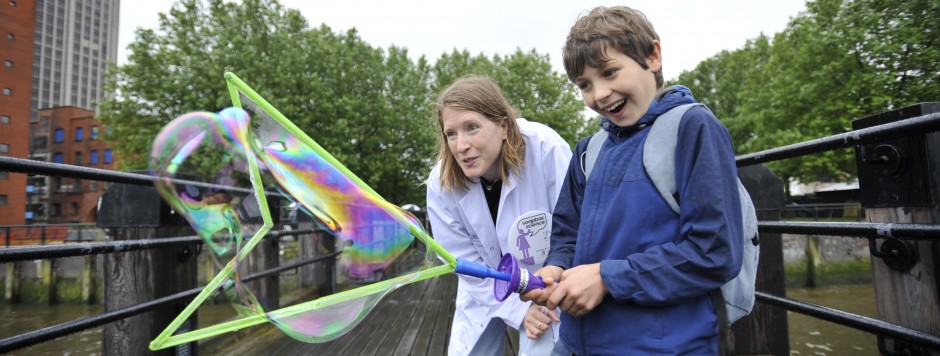 Emma Cascant-Lopez (@EmCascant), NIAB-EMR, will be taking part in Soapbox Science Canterbury 2018 on 23rd June, giving a talk entitled “The circadian clock: How pathogens know when is the best time for infection”
Emma Cascant-Lopez (@EmCascant), NIAB-EMR, will be taking part in Soapbox Science Canterbury 2018 on 23rd June, giving a talk entitled “The circadian clock: How pathogens know when is the best time for infection”
SS: How did you get to your current position?
ECL: My name is Emma Cascant. After finishing my Biology degree in Valencia (Spain), I came to England to gain work experience through a Leonardo Studentship. I worked during 6 months at the genetics department of NIAB EMR, looking at the science behind the rootstock-scion interaction in crop plants. At the end of the placement I was convinced I wanted to do a PhD, and I was offered a PhD position at the same institute. My research focused in the study of the circadian clock of an important plant-pathogen that causes devastating loses to the horticultural industry. The aim was to elucidate time-specific pathogenic responses that could allow the development of highly precise control measures of the plant-pathogen. Currently, I just started a PostDoc at NIAB EMR to understand the lifecycle of the fungal plant-pathogen Verticillium dahliae and regulation by environmental signals such as light and temperature, with the intention to come up with novel effective management strategies.
SS: What, or who, inspired you to get a career in science?
ECL: During high-school I was inspired by my Biology teacher. She made me love and admire the subject, and I was always amazed by how molecularly complicated but perfect life is. That is the reason why I studied Biology at the University, and despite being more inclined towards molecular biology, I enjoyed every subject very much due to the enthusiasm of my professors.
SS: What is the most fascinating aspect of your research/work?
ECL: Studying the circadian clock is very fascinating. This molecular mechanism allows organisms to track time, which increases the efficiency of many metabolic, behavioural and physiologic processes, i.e. sleep and hormone production. The desynchronization of the circadian clock is the cause of jet lag, and can be the cause of several illnesses in rotational shift workers. The clock also exists in plants and fungi. It is exciting to think that the control of fungal plant-diseases could be more successful by applying the treatment in a specific time-of-day. Not only it would allow an increase in efficiency, but it could reduce the amount of treatment needed. Win-win!
SS: What attracted you to Soapbox Science in the first place?
ECL: I wish more people would want to become a scientist. Showing not only how important for our society is, but how exciting it can be may inspire young generations to pursue a career in science. I hope that the Soapbox Science event turns out being very productive in engaging young (and not so young) girls in science. I am also very attracted to meet other woman in STEM, and hopefully create networks for future collaboration or public engagement events.
SS: Sum up in one word your expectations for the day
ECL: Fun
SS: If you could change one thing about the scientific culture right now, what would it be?
ECL: The way of informing and communicating our research to the public. Scientists usually feel more comfortable to communicate their research to other members of the scientific community. However, more efforts should be made to reach a wider public and empower people to have critical thinking. In my opinion, some people could change their mind about topics such as GMOs if there were more information about the biology and methodology behind them. However, the public is bombarded with all kind of pseudoscientific information. Furthermore, public engagement needs to be a two-way process, where public could express their concerns on different topics. As an example, plant-pathologists should work and engage with growers and industry to share knowledge and come up with feasible strategies for crop management.
SS: What would be your top recommendation to a woman studying for a PhD and considering pursuing a career in academia?
ECL: I would tell them to be perseverant and always believe in their potential. To get involved in a wide range of University or public engagement events and to build their network and collaborate with other researchers.
